Congressional Race Remains Tight

As has been the case for the past year, neither political party has a clear advantage in the upcoming battle for control of the House. Voters are evenly divided, with 44% favoring the Republican candidate in their district, and 46% favoring the Democrat. And when the population is limited to likely voters, this is virtually unchanged (47% intend to vote Democratic, 46% Republican).
Interest in the campaign remains comparable to past midterm elections. Today, 45% of voters say they have given quite a lot of thought to the upcoming race, compared with 42% at this point in the 1998 race and 44% in early October 1994. Similarly, two-thirds are following news about candidates and campaigns in their state and district at least fairly closely, on par with news interest in early October 1994 and 1998.
Public intentions to vote are also comparable with previous midterms. Fully 95% of registered voters say they plan to vote on Nov. 5, and nearly two-thirds (64%) rank their chance of voting as a “10” on a scale from one-to-ten. Both figures are virtually identical to early October measures in 1994 and 1998.

One difference from the elections of four and eight years ago is the absence of a partisan gap in voter interest. In each of the past two monthly surveys, Democrats have expressed as much interest in the election as Republicans, which represents a break from previous years. In 1998, for example, Republicans were 10% more likely to say they had given a lot of thought to the race and 7% more likely to be following campaign news, both strong indicators of actual turnout on election day. This year, Democrats are just as likely to have followed news and thought about the election. However Democrats remain somewhat less likely than Republicans to label themselves as “definite” voters.

Persistent Gender Gap
There are few surprises in congressional voting intentions when the population is broken into subgroups. There is a substantial gender gap with men favoring Republican candidates by 51% to 39% and women favoring Democratic candidates by roughly the same margin (52% to 38%). This gender gap is similar across all age groups, but is particularly noteworthy among younger voters who do not have children. Women age 18-49 without children favor the Democratic candidate in their district by a 65% to 26% margin, while their male counterparts are voting Republican by a 57% to 35% margin. The gender gap among parents, and among those age 50 and older, is less pronounced.
As in most midterm elections, each party is holding on to its partisan base, with competition focused primarily on political independents. Currently, 42% of independents favor the Democratic candidate in their district, while 35% favor the Republican. This is similar to the 41%-38% Democratic edge among independents a month ago. African-American voters remain firmly in the Democratic camp, while whites, on the whole, favor the Republicans (50% to 40%).
Despite stock market doldrums, Republicans hold an edge among active stock market investors, while Democrats are clearly favored by those who are not in the market. To a large extent, however, this simply reflects longstanding income differences between investors and non-investors. Fully 86% of respondents in households earning $75,000 or more annually have some kind of market investment, compared with just 22% of those earning under $20,000 annually.
Not surprisingly, the majority (56%) of those who favor military action in Iraq plan to vote Republican on Nov. 5, while nearly three-quarters (72%) of those in opposition to military action intend to vote Democratic.

Economy Top Concern
The economy has risen to become the predominant concern in the minds of voters as they consider their congressional vote. However, there is no evidence that it is working to the advantage of either party.
Fully 55% of voters cited a range of economic issues, including jobs and unemployment and the state of the budget, when asked what issues they want to hear candidates in their state and district talk about. This represents a dramatic increase from June, when just 20% cited economic issues as a priority. Voters also want to hear about a number of other domestic issues; one-in-five (21%) identified education and one-in-ten (9%) cited health care and health insurance as issues they want to hear discussed. Unlike the economy, voter interest in these campaign issues is relatively unchanged from June.
More than one-in-five voters (22%) volunteered issues relating to terrorism, national security, foreign policy or Iraq as topics they want to hear candidates discuss. Of these, 11% want to hear candidates’ views on terrorism, and 4% want to hear candidates’ positions on Iraq. In general, men express more interest in these topics than women.
Little Advantage on Economy, Foreign Policy
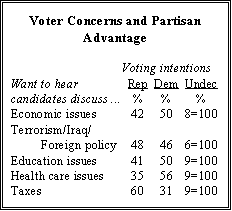
Despite high voter interest in the economy and domestic policy, the impact of these issues on voting intentions is, at best, limited. Democrats have a slight advantage among those who want to hear candidates talk about economic issues. These voters favor the Democratic candidate over the Republican by 50% to 42%.
Similarly, voters who want to hear candidates discuss foreign policy, the war in Iraq or the war on terrorism are roughly evenly divided between the two parties (48% favor the Republican candidate, 46% the Democrat). It is only when it comes to health care and taxes issues which are clear strengths for the Democratic and Republican parties, respectively that voter interests are clearly aligned with voting intentions.
While voters on both sides may want to hear candidates discuss economic issues, economic perceptions clearly pose a potential problem for the Republicans. While voters who rate their financial situation as excellent or good lean Republican at this point by a 55% to 38% margin, half of voters say they are in only fair or poor financial shape, and favor the Democrats by 55% to 34%.

And economic outlook is also strongly related to voting preferences. Fully two thirds (68%) of those who think the nation’s economy will get worse over the next year say they plan to vote for the Democratic candidate in their district. But just 18% of voters hold this view at this time.
What Americans are Talking About
With so many major events over the past year, Americans are talking about a range of national issues. The possibility of war with Iraq is the most frequently discussed issue 52% say this often comes up in their personal conversations and another 32% say this happens at least occasionally. Nearly as many (48%) frequently discuss the threat of terrorist attacks on the U.S. and roughly four-in-ten often talk about problems with health insurance and HMOs, economic conditions in the nation, and problems with public education.
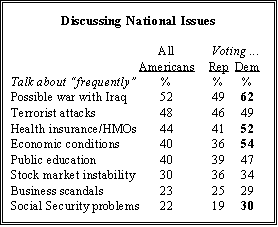
An analysis of what voters are discussing reveals that Democratic voters are talking about the economy with friends and family more frequently than are those who plan to vote Republican. But Democratic voters are talking about many issues more often, including a possible war with Iraq, and problems with health insurance and Social Security.
However, the growing focus on Iraq has created a bigger gap in the interest of Democratic and Republican voters on a number of other issues, including the economy. In June, Democratic voters were only slightly more likely than those intending to vote Republican to be discussing economic conditions frequently. Today, the economy remains a frequent conversation among Democratic voters, but is frequently discussed by just 36% of those intending to vote Republican. Similarly, problems with public education came up frequently among half of both Republican and Democratic voters in June. Today, this topic is significantly more prevalent among Democratic voters than Republicans.
Party Images

In the current survey, the Democrats hold, at best, a slight 41%-37% edge as the party better able to deal with the economy. Still, this represents an improvement from January, when a plurality favored the Republicans to handle the economy (45% to 33%).
And while a 44% plurality continues to see the Republican Party as best able to deal with the terrorist threat at home, Democrats have made gains since the beginning of the year. In January, just 16% favored the Democratic Party on this issue. Today, this has risen to 28%. Republicans also have a solid lead when it comes to handling the situation in Iraq 46% of voters think Republicans would make wiser decisions about what to do in Iraq, 30% have more confidence in the Democratic Party.
Though the Republican Party has a clear edge on the issue of homeland defense, it is not clear that this is translating into an electoral advantage. Voters who are worried about the prospects of another terrorist attack on the United States are no more likely to vote Republican than those who do not worry about the prospects of another attack. Rather, voters worried about terrorism divide their electoral preferences (47% Democratic, 44% Republican) almost exactly the same way as those who are not worried (45% Democratic, 44% Republican).
Business Scandals Fail to Resonate
For the most part, the wave of recent business scandals has not become a significant factor in the November congressional elections. Compared to other political issues, it is a relatively infrequent topic of conversation among voters, and just 2% of voters volunteered it as an issue they specifically want to hear the candidates discuss during the campaign.
As has been the case throughout the year, roughly three-in-ten Americans say they are following news about corporate corruption very closely, with no signs of increasing interest in recent months. And when asked whether Congress has passed a law to toughen regulations on corporate accounting practices or not, just 28% correctly said “yes.” Roughly four-in-ten said they didn’t know, and fully 31% believed, incorrectly, no law had been passed.

Moreover, there is little evidence that either party has a clear advantage on the issue. In early September, a Pew Research Center poll found that, if anything, the Republican Party held a slight edge on “dealing with corporate corruption.”
The current survey tests public views on this issue in two ways, with one question focusing on bringing corrupt business executives to justice, the other on reforming business practices. While neither party has an advantage in being seen as the party that will bring corrupt business executives to justice, Democrats have a slight edge (41%-33%) as the party that will require corporations to reform their business practices. The Democrats’ advantage is greatest among those who think that Congress did not enact corporate accounting legislation this summer; this group favors the Democrats on the issue by two-to-one.
Incumbent Support on Par

Most voters (58%) say they want to see their own member of Congress reelected virtually the same as in 1998 and 1990, but significantly higher than in 1994. And while Americans are divided over whether they want to see most members of Congress reelected (39% say yes, 38% no), this is identical to 1998. In 1994, a majority (56%) said they wanted to see most incumbents kicked out.
Voters rate national issues as slightly more important than in past elections, but overall, the electorate takes into account a range of issues when evaluating their congressional candidates. Slightly more than a third (35%) say local or state issues make the biggest difference in how they vote, while 28% say national issues are most important up from 23% four years ago, and 22% in early October 1994. One-quarter say a candidate’s character or experience makes the biggest difference to them, while just 5% say party is the predominant factor in their vote.
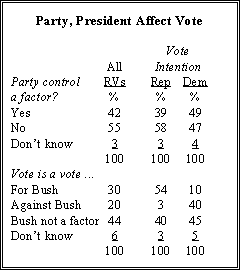
While not the biggest factor, party is a factor in many people’s electoral choices, and this is particularly the case among Democratic voters this year. Half of those intending to vote for the Democratic candidate in their district (49%) say the issue of which party controls Congress will be a factor in their vote just 39% of Republican voters say the same. But overall, 55% of registered voters say the makeup of the 108th congress will not be a factor in their vote.
President Bush’s performance may well be a growing factor in the election this year. Half of registered voters say they think of their vote this fall as a vote for or against the president, up from 44% in early September. Fully 54% of Republican voters think of their vote as a vote for George W. Bush, while 40% of those who intend to vote Democratic consider their vote a vote against the president. While Bush remains a bigger factor for Republican voters, Democratic voters are thinking more about the president than a month ago, when only 30% said they were voting against the president.
No Evidence of 401k Fallout
The recent downturn in the stock market is affecting a significant proportion of the electorate. A solid majority Americans (57%), and 63% of registered voters say they have some of their finances invested in the stock market, either through retirement accounts, mutual funds, or stocks. One-quarter of voters (24%) have made changes to their investments over the past year, and 14% have bought or sold shares within the past six months. Those who have experienced market losses are about twice as likely as those who have not to have made recent changes to their investments.

But there is no evidence that voters are connecting these recent market experiences to the congressional elections. Voters who have market investments are significantly more likely than non-investors to favor the Republican candidate in their district, largely reflecting differences in income. But among investors, gains and losses have little relation to prospective votes. Nearly half (49%) of investors who say they have lost a lot of money recently plan to vote Republican, while 43% favor the Democratic candidate in their district. This is no different from those who have not lost money recently, who are divided between the parties (45% intend to vote Republican, 44% Democratic).
War Support More Solid Than Opposition

A solid majority of the public 62% supports military action in Iraq to end Saddam Hussein’s rule, with 28% opposed, a division of public opinion on the issue which has been relatively unchanged throughout the course of the year. Aside from the partisan gap over taking military action against Iraq, support for military force is considerably stronger among men than among women, though a majority of women (56%) also support the use of force.
Older Americans are somewhat less supportive than younger people of using force against Iraq. Half of those age 65 and older say they favor military action against Baghdad; 34% are opposed. By contrast, two-thirds (65%) of those younger than 50 are in favor. African Americans are divided, with 47% opposing the use of force and 43% in favor, while whites support military action by a fairly substantial margin (65%-25%).
Most of those who take a position on Iraq say that their opinion is strongly held, but supporters of military action are more solid in their views than the opponents. While 62% of Americans favor military action against Iraq, 49% say they support that position strongly while just 12% say they could change their mind. By contrast, among the 28% who oppose the use of force, 17% feel strongly and 11% say they could change their opinion. Among those who have thought “a lot” about the issue, 58% strongly support military action; 22% strongly oppose it. Among respondents who have thought less about the issue, support for the use of force is weaker.
Opposition More Engaged
While strong supporters of military action in Iraq outnumber strong opponents by nearly three-to-one (49% to 17%), the opponents show a greater level of interest and engagement in the issue. Overall, 62% of those who oppose military action and 70% of those who feel strongly about the issue say they frequently talk about Iraq with friends and family. By comparison, just half of those who favor the use of military force and 53% of those who strongly hold that view say they frequently discuss the matter.
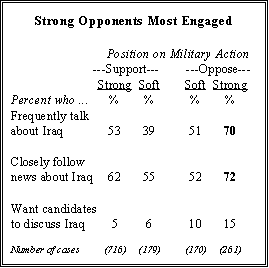
Strong opponents of the war also show significantly more interest in news about the political debate over military action, and are three times as likely as strong supporters of military action to want to hear candidates discuss the issue as part of their campaigns.
Reasons For and Against War
Most supporters of military action against Iraq share the Bush administration’s underlying rationale for the use of force. Respondents were asked to describe, in their own words, why they favored military action. The perceived link between the Iraqi regime and terrorism either past or future and the more general perception of the threat Iraq poses to the United States and the world form the basis for support.
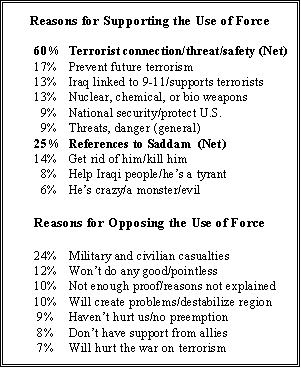
Among those who favor the use of force, six-in-ten mention some aspect of the military or terrorist threat from Iraq as a reason for their support. Nearly one-in-five (17%) explicitly mention the prevention of future terrorism. Many (13%) say that Iraq was linked to Sept. 11 or other past terrorist acts, and the same number support military action on a belief that Iraq has weapons of mass destruction.
A quarter of those who favor military action explain their position in terms of Saddam Hussein personally: that he is dangerous; that he is evil; that he is a tyrant who oppresses his people; or that he simply needs to be removed from power.
Concern over of casualties, both military and civilian, is the leading factor cited by opponents of military action against Iraq. Nearly a quarter of opponents (24%) mentioned casualties, while 10% cited a lack of proof that Iraq is involved in terrorism and the same number fear it will destabilize the region or cause a wider war. Among other reasons are that the war in Iraq won’t do any good (12%) and concerns about striking first when we have not been attacked (9%).
Weapons Inspections a Key Issue
The issue of weapons inspections, now at the center of diplomatic efforts by the U.S. and the United Nations, could affect public opinion on military action, at least in the short run. Significant numbers of people say they would switch positions on the use of force, depending on whether or not Saddam Hussein cooperates with “full and complete” weapons inspections.
If Saddam were to agree to such rigorous weapons inspections, half of the supporters of military action (51%) would continue to favor the use of force, but a sizable minority (43%) would oppose taking military action. Similarly, if Saddam were to reject tough weapons inspections, most of those who do not favor (50%) would remain opposed, but 39% would then support military action against Iraq. Thus, depending on the outcome of the current debate over weapons inspections, a majority of the public (55%) could oppose the use of force, or, alternatively, an overwhelming majority of the public (72%) could favor it.
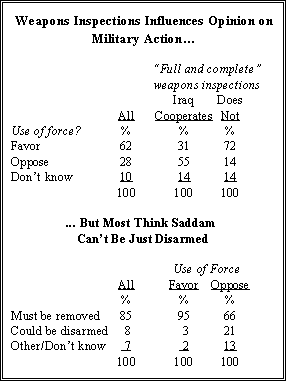
Still, there is widespread doubt that Saddam can be effectively disarmed. Overall, 85% think he has to be removed from power, and only 8% think he could be disarmed and left in power. Even among opponents of American military action, just one-in-five (21%) think Saddam can be disarmed but left in power.
But Americans have not completely ruled out the possibility that a peaceful solution might be found. A majority of 56% say they think war still might be avoided, while 39% believe that war seems inevitable. Those who oppose using force are more optimistic than supporters. Seven-in-ten opponents (69%) believe military action can be averted; proponents of the use of force are divided, with 46% feeling that war is inevitable and 50% saying it still can be avoided.
Most Don’t See Rush to War
As the debate on the possibility of military action in Iraq heads for a resolution in Congress, the public is generally positive about the process, but very cynical in its evaluation of political leaders who do not agree with them on the issue.
Half of Americans (51%) say the president is giving the question of military action careful thought, but a substantial minority (34%) say he is moving too quickly and just one-in-ten say he moving too slowly. Half (51%) also believe Congress is giving the issue careful consideration, while nearly a quarter (24%) think lawmakers are moving too slowly and 15% say they are rushing through the debate.
And yet an overwhelming majority of the public says that politicians on the other side of the issue are not sincere in their beliefs that they are taking their position for political reasons. This view is as strong among supporters of the war as among opponents. Three-quarters of supporters of military action think politicians who oppose the war are doing so for political reasons, and 80% of opponents of the war say that about politicians who support the war. These views may reflect political cynicism as much as anything, given the generally positive opinion concerning debate about this issue.
Public Perceptions About Iraq
At the heart of public opinion about what the U.S. should do in Iraq are a series of key perceptions about Saddam’s capabilities and intentions, the level of allied support, and the consequences of war. Public opinion is united on two essential points stressed by the Bush administration as it has tried to make its case to the public: an overwhelming majority of the public (79%) thinks Saddam Hussein is close to obtaining nuclear weapons or already has them. And two-thirds (66%) believe that he helped the terrorists who attacked the U.S. on Sept. 11.
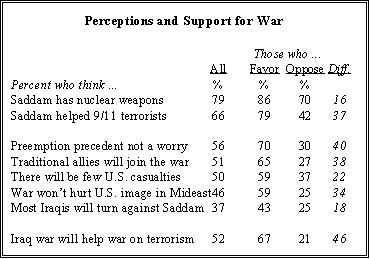
But the public is divided on several other key worries. While most (56%) say they are not concerned that attacking Iraq without first having been attacked will send a signal to other nations that preemptive strikes are acceptable, 40% do worry about this. Half (51%) think most traditional U.S. allies would join in a military effort against Iraq, but 33% think they would not go along with such an effort. And half (50%) think a war with Iraq will result in relatively few American casualties, while about 40% think there will be many casualties.
Public opinion also is split on the question of whether the image of the U.S. among Muslim nations will suffer major damage: 48% hold this view, while nearly as many (46%) believe damage to the U.S. image will be minimal. And more Americans believe that the Iraqi people will support Saddam in the event of a U.S. attack than think they will turn against him (45% vs. 37%).
Ties to Terrorism Shape Views on Force
A key concern is whether military action in Iraq will help or hinder the more general war against terrorism. About half of the public (52%) thinks that a war with Iraq will help the war on terrorism, but a third (34%) disagree and think it will hurt the effort.
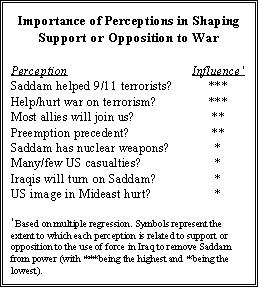
This perception, along with the belief that Saddam Hussein was linked to the Sept. 11 attacks, is critical to opinion on taking military action against Iraq. An analysis of opinion about the use of force shows that viewing Iraq through the lens of the fight against terrorism the perspective at the core of the Bush administration’s policy is the most important determinant of support or opposition to military action.
Beliefs about the likelihood of allied support are also highly influential in shaping attitudes about war. And people who do not worry about the ramifications of the example of a preemptive strike are significantly more supportive of military action than those who do worry about this. Perceptions of Saddam’s nuclear capability make a difference, but are not a deciding factor for many people, given how widely shared is the view that he has or can obtain nuclear weapons: Even among those who oppose military action, 70% think he has, or will soon have, nuclear weapons.
The power of these key perceptions to override other concerns can be seen in two typical examples. Surprisingly, the issue of casualties is less influential than many other concerns. Among people who think Saddam helped the terrorists on 9/11, those who expect heavy U.S. casualties from a war with Iraq still support it by a wide majority (61%-28%). Similarly, 73% of those who expect that ousting Saddam Hussein will help the war on terrorism support using military force, even though they expect heavy U.S. casualties.
The importance of allied support is seen in a similar comparison. Here, a concern with “going it alone” overcomes even the perception that Saddam is close to having nuclear weapons. Among those who think he has or soon will have nuclear arms, the belief that our allies will join us results in overwhelming support for military action (81%-14%); those believing our allies will not join us oppose military action by a margin of 47% to 43% again, even among those who think he has nuclear weapons or may soon possess them.
Perceptions of how Muslim nations would react to a U.S. attack on Iraq have almost no impact on whether people favor or oppose military action when other more critical concerns are taken into account. And perceptions about whether the Iraqi people will rise up against Saddam have little independent impact on whether the public favors or opposes military action.
Few Supporters Have Second Thoughts
The survey shows that opinion on taking military action against Iraq did not significantly change when the question was retested after respondents were asked for their perceptions of the situation. The vast majority of respondents (79%) gave the same response about the use of military force at two different points in the survey. Despite having been taken through a wide range of considerations and possible arguments for and against their own position, only 7% changed sides; 14% moved between categories of strength or into or out of the undecided category.

Among those who changed their views, most moved in the direction of support for military action. Among those who strongly favored military action at the beginning of the series, 94% remained strongly committed. But of those supporters who initially said they might change their mind, a quarter (26%) ended up moving from tentative support to strong support of military action, and only 7% switched sides to oppose the use of force.
By contrast, nearly a quarter of the strong opponents of military action shifted their views, with 7% continuing to oppose war but saying they might change their minds and 12% saying they now favored the use of force. And among opponents who initially said they might change their minds, fully one-fifth did so and said they favored military action at the conclusion of the survey. Among those who were initially undecided on the question, 28% ultimately said they would support military action, while 14% would oppose it. Only 55% of this group remained undecided.
Bush Job Rating at 61%
President Bush’s job approval rating now stands at 61%, virtually the same level as in late August (60%). His job rating had risen to 67% in mid-September, following his speeches for the 9/11 anniversary and his address to the United Nations.
In terms of his ratings on specific issues, the president gets his highest marks on handling terrorist threats. Fully 71% approve of his handling of terrorist threats, largely unchanged since June when 74% gave him a positive rating. Bush wins bipartisan approval on this issue 89% of Republicans and 59% of Democrats say he is doing a good job in dealing with terrorism.
The president also receives relatively good marks for his handling of situations in the Middle East and Iraq (58%, 56%). But views of Bush’s performance in these areas are more divided along partisan lines. More than eight-in-ten Republicans and fewer than four-in-ten Democrats give the president positive ratings on the Middle East and Iraq.
Half Approve of Bush on Economy
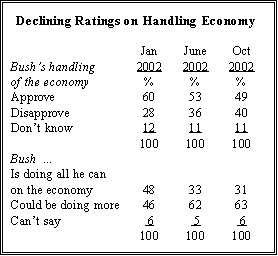
Roughly half of Americans (49%) approve of the job the president is doing on the economy, while 40% disapprove. The president’s rating in this area has fallen steadily since the start of the year: from 60% in January to 53% in June and 49% currently. Americans give the president comparable marks for his handling of the jobs situation (47% approve, 38% disapprove).
The partisan gap on Bush’s ratings on the economy is predictably wide, but he continues to receive a net positive rating from independents (49%-41%). The president has lost some ground since June among college graduates, however. College graduates approved of his handling of the economy by 58%-35% in June. In the current survey, they approve of his job performance on this issue by 50%-42%.
As in June, roughly a third of Americans (31%) say Bush is doing all he can to improve the economy while fully twice as many (63%) think he could be doing more. Among partisan groups, only a majority of Republicans (54%) believe the president is doing as much as he can on the economy. Just 16% of Democrats and 24% of independents agree.
More See Terrorism as Priority
Despite the public’s concern about the struggling economy, particularly in regard to the midterm election, an increasing number of people rate terrorism as a more important priority for the president. More than four-in-ten (45%) say it is more important for Bush to focus on the war on terrorism, while 36% say it is more essential that he focus on the economy. In late August, a narrow 39% plurality said it was more important for the president to focus on the economy.
The shift on this issue perhaps in response to Iraq has been most pronounced among Republicans. In August, Republicans viewed the war on terrorism as a greater priority by 46%-33%; in the current survey, that margin has grown to 59%-22%. Among Democrats, the change has been more modest: by 45%-38%, Democrats regard the economy as the more important priority. In August, the margin was 44%-30%.
Bush Improves On Corporate Scandals
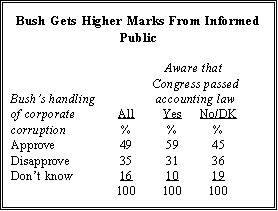
In June, the public was divided over the president’s handling of the recent series of corporate scandals (40% approve, 38% disapprove). But perceptions of his performance in this area have improved noticeably. Roughly half (49%) approve of the job he is doing on this issue, while 35% disapprove.
Americans are generally unaware of the passage of legislation this summer, with Bush’s backing, to toughen regulations on corporate accounting practices. Fewer than three-in-ten knew this occurred. But those who are aware Congress and the president agreed on this legislation give Bush much higher marks on this issue than those who are not. Six-in-ten (59%) of those who knew about enactment of the accounting regulations approve of Bush’s handling of this issue compared with 45% of those who did not know the law was passed.
Bush Legacy? Too Soon to Tell
The public is not quite ready to declare Bush’s presidency successful. A 44% plurality says it is too early to tell. But among those who are willing to render judgment, more see his tenure as successful than unsuccessful (by 40%-15%). As Bush was about to take office in January 2001, not surprisingly, most Americans (58%) said it was too soon to tell if he would be successful. But the proportion who said his presidency would be unsuccessful has not increased since then.
The president fares better on this measure than his predecessor did at a comparable stage in his presidency. In October 1994, the month before Republicans captured Congress, more Americans predicted Bill Clinton’s presidency would be unsuccessful than successful (35%-14%).
Increased Interest in 9/11 Reports
The debate over possible military action against Iraq dominated the September news interest index, but the public also paid increasing attention to reports that the FBI and CIA had information about the 9/11 attacks before they occurred. Four-in ten Americans (41%) followed that story very closely, up from 32% in June.
The recent hurricanes that struck the Gulf Coast attracted a comparable level of news interest (38% very closely). Not surprisingly, there is a strong regional component to interest in this story. Six-in-ten of those living in the South (59%) paid very close attention to news of the hurricanes. Interest was significantly lower in other parts of the country.
Nearly a third of Americans (32%) tracked continued Middle East violence very closely. Interest in this story peaked in April (44% very closely), following a series of Palestinian suicide bombings and Israeli counter-attacks.
The same proportion of the public (32%) followed recent fluctuations in the stock market very closely. As expected, active investors those who have traded stocks in the last six months tracked the news on the stock market much more closely than those who merely hold investments and people who are not invested in the stock market. Six-in-ten active investors (62%) followed news on the stock market very closely compared with 38% of less active investors and just 18% of non-investors.
News about business scandals and corporate corruption continue to attract very close interest from about three-in-ten Americans (29%). And roughly about a quarter say they paid very close attention to the government budget difficulties affecting their states.




